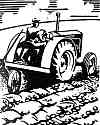|
As an
added attraction in
the car, they had one of the very early X-Ray machines, so Friday
afternoon at recess, I dismissed the school and walked to the depot
with the older boys and girls. The pupils had a wonderful time with the
X-Rays looking at the bones in their hands, and the nails in their
shoes. I believe everyone of them learned much from the experience.
On the following Sunday, after church, the Minister called one of the school directors aside and in a disturbed voice said, "I understand that the teacher dismissed school and walked down to see that California exhibit without your permission. That was bad enough," he continued, "but why did he show the boys and girls that infernal machine they call an X-Ray ? You know it must be the work of the evil spirit because if human eyes were intended to see through boards, Nature would have given them that power." That was less than 50 years ago. Today, doctors everywhere are constantly using this "infernal machine" and many other similar scientific devices in their successful fight against disease, and the X-Ray is an everyday tool in industry even to internally examining slabs of steel a foot or more thick.  As I look down Main Street here today, I see many automobiles
parked where the hitching rails used to be - over there is a Motion
Picture Theatre and nearly every home and farm has a telephone and
electricity. Large airplanes pass overhead and the smaller ones can
land here. A thousand radios bring us the best in music and
entertainment as well as news from the fighting fronts. The farmers in
the neighborhood are very up-to-date and because of fine highways, are
an integral part of the community. In town there are churches, new
schools, paved streets - as well as sewers, waterworks, natural gas and
all the other things that have followed in the wake of the automobile
and electric power.
As I look down Main Street here today, I see many automobiles
parked where the hitching rails used to be - over there is a Motion
Picture Theatre and nearly every home and farm has a telephone and
electricity. Large airplanes pass overhead and the smaller ones can
land here. A thousand radios bring us the best in music and
entertainment as well as news from the fighting fronts. The farmers in
the neighborhood are very up-to-date and because of fine highways, are
an integral part of the community. In town there are churches, new
schools, paved streets - as well as sewers, waterworks, natural gas and
all the other things that have followed in the wake of the automobile
and electric power. |








